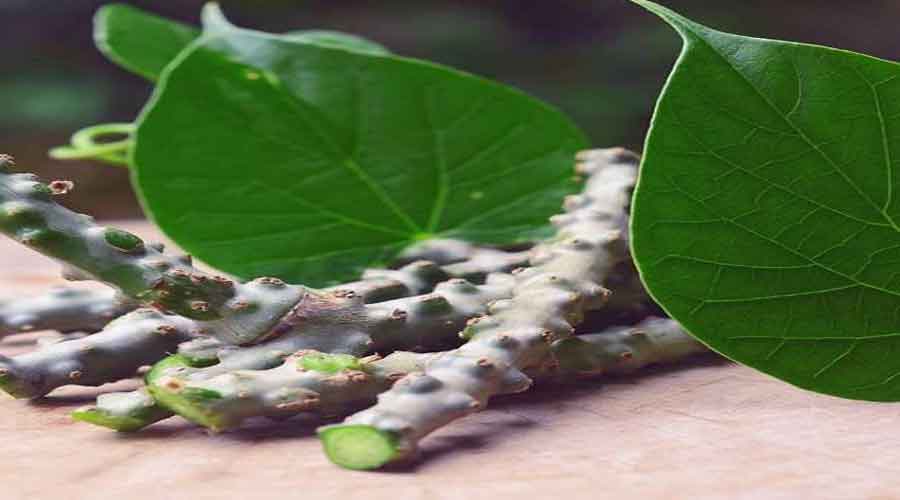Sections of Indian doctors are worried at what they see as the Centre’s continued advocacy of a herb called giloy as a shield against Covid-19 despite indications that it can cause liver damage in some people.
The Union ministry for ayurveda, yoga, unani, siddha and homoeopathy (ayush) has thrice in the past nine months asserted that giloy is “safe” although doctors from 12 cities have documented what they believe is giloy-induced liver damage in at least 49 patients.
The doctors say they are disappointed at what they view as the ayush ministry’s hostility and resistance to addressing legitimate scientific questions raised by their observations — documented in peer-reviewed medical journals — of liver injury in people who had consumed giloy.
“What we’ve seen are emotional, knee-jerk reactions accusing us of trying to defame ayurveda,” said Aabha Nagral, a gastroenterologist at the Jaslok Hospital, Mumbai. “On the contrary, it is possible that giloy has an immune-boosting effect that needs to be understood better.”
Nagral and her colleagues were the first to sound an alert in July 2021, describing in the Journal of Clinical and Experimental Hepatology the details of six patients — four women and two men — who developed liver damage after consuming giloy. One of the women died of liver failure.
All the patients had consumed extracts of the herb Tinospora cordifolia — giloy or guduchi in ayurveda — for weeks to months after learning that the ayush ministry had listed giloy among traditional medicines for the prevention and treatment of Covid-19.
An interdisciplinary panel tasked by the ayush ministry for the integration of ayurveda and yoga in Covid-19 treatment protocols had in July 2020 cited classical ayurveda texts and multiple lab studies to justify the inclusion of giloy into those protocols.
The ayush ministry has said three computer simulation studies have shown that giloy binds with high efficiency to SARS-CoV-2, the virus that causes Covid-19, and that many studies have shown its anti-viral and immune-boosting characteristics.
The ministry has also said it has tracked seven other studies involving over 133,000 people to evaluate giloy, either as a preventive medication or as a treatment for asymptomatic Covid-19 “with very good results and without any side-effects”.
But the doctors who have raised concerns about giloy say the results of those studies remain unpublished.
“A search on authoritative global databases of medical research will show zero human clinical trials to evaluate the efficacy of giloy on Covid-19,” said Cyriac Abby Philips, a liver specialist in Aluva, Kerala. “Where are the results of those seven studies?”
Queries sent by The Telegraph to the ayush ministry seeking responses to the concerns flagged by doctors have not evoked a response.
Philips and doctors from 11 other cities — Bangalore, Calcutta, Chennai, Delhi, Hubli, Hyderabad, Kolhapur, Lucknow, Mumbai, Mohali and Pune — have published a large, multi-centre, nationwide study reporting liver damage in 43 patients in Hepatology Communications, a peer-reviewed journal.
Two of those patients died and one patient had to undergo a liver transplant.
Biopsies on liver tissue samples conducted by both groups of doctors — Nagral and her team, and Philips and his collaborators — have revealed signs of drug-induced liver injury and auto-immune responses, indicating that something had activated the immune system to attack liver cells.
The doctors suspect that giloy has a biological effect which, in some patients, can trigger liver injury by pushing the immune system into overdrive and worsening auto-immune hepatitis in people with silent auto-immune-related liver disease.
Philips says both the studies underscore concerns that just because a herbal product has been used for centuries it may not be deemed safe for every person who takes it.
India’s drug regulations allow the sale of traditional herbal medicines without the rigorous assessment through clinical studies imposed on modern medicines if all the ingredients of the herbal medicines are mentioned in any of a set of ancient ayurvedic texts.
Ayurveda specialists have argued in the past that medicines used for centuries are safe, but modern medical practitioners believe the case of giloy suggests that rare but serious side-effects may have remained unrecognised.
“This is what we’d call an idiosyncratic adverse reaction to a drug,” said Nagral. “It is something like the rare adverse reaction to penicillin. Giloy-induced liver damage won’t happen to everybody, but some patients with certain underlying medical conditions might be susceptible.”
This could indeed mean giloy possesses some immune-boosting properties.
“But they need to be studied through a scientific process so the whole world will accept it. And giloy, just as other modern medicines, might also come with adverse effects for certain patients,” Nagral said. “Ideally, we should be collaborating with ayush on this.”
But both Nagral’s and Philips’s papers have prompted the ayush ministry to assert that giloy is safe and to question their research findings.
Five days after Nagral and her colleagues published their paper, the ayush ministry issued a media release describing the work as “completely misleading” and saying that papers based on incomplete data can “open the door for misinformation and defame the age-old practice of ayurveda”.
On October 5 last year, the ministry again said giloy was safe to use but added that it was “advisable to use it in consultation with a qualified ayush physician”.
But the cases documented by Nagral and Philips suggest that patients influenced by messages from ayush have been consuming giloy on their own, buying them from retail outlets or even making their own extracts from shrubs in their own backyards.
The ayush ministry had cautioned last year that a related shrub, Tinosporia crispa, which may have adverse health effects, should not be mistaken for Tinospora cordifolia, or giloy.
On February 16, about a month after Philips and his colleagues published their paper on the nationwide study, the ayush ministry again issued a public statement saying giloy was safe and had been “falsely linked to liver damage”.
But in that release, the ayush ministry itself hinted that giloy may have adverse effects at high concentrations, citing studies that showed that high concentrations of giloy shortened the life span of fruit flies and emphasising that it should be consumed in appropriate doses.
Philips says the February 16 release exposes the ayush ministry’s bluff. “You can’t assert that something is safe and non-toxic and at the same time caution that it should be taken only in appropriate doses,” he said.
“What is the appropriate dose of giloy for Covid-19? Where is the data that establishes the effect of that dose?”
The ayush ministry did not respond to queries on the appropriate dose and the evidence for that concentration in the prevention or treatment of Covid-19.












